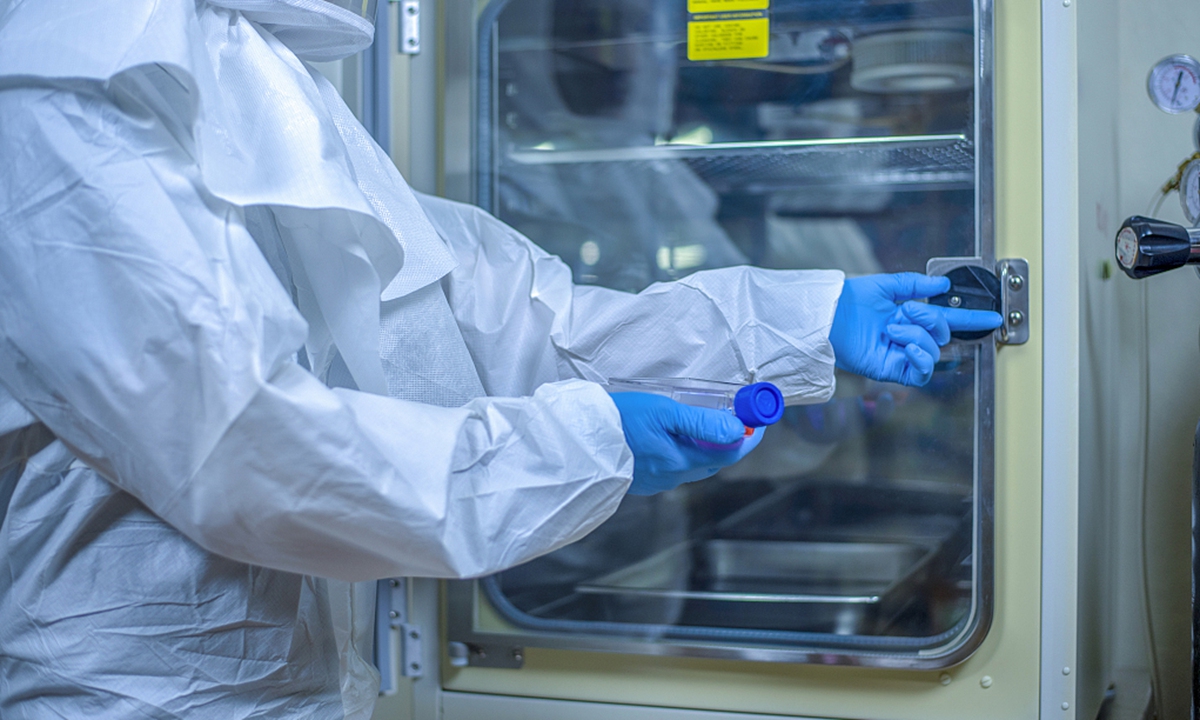
Photo:VCG
The epidemic command center of Taiwan island on Friday announced to form a experts investigation group, following the center's confirmation that a female researcher at a P3 laboratory in Taipei has tested positive for COVID-19 and very likely she got infected when experimenting the virus in the lab.
The infection was the first locally-transmitted case since early November, and the first P3 staff member's COVID-19 infection in the island, local media said, brought mass panic amid the local residents.
Chen Shih-chung, head of the island's epidemic command center, said on Friday that the fully-vaccinated researcher, has exposed to the pathogen in mid-November while working at the P3 lab in Taipei, and showed symptom of cough on November 26 and had problems with sense and taste on Wednesday.
The researcher was bitten by a COVID-infected lab mouse on November 19, but the island's health authority said it is possible to catch the disease in this way, but it is very rare.
The mayor of Taipei Ko Wen-je said there are currently no cases of animal to human transmission in Taiwan, so the COVID-19 researcher's infection was more likely that the virus was released during experimenting processing.
110 close contacts have been traced so far, with 86 negative nucleic acid tests samples and 24 under the testing process, Taiwan media said, highlighting that a negative result does not mean a complete absence of infection.
The epidemic command center said investigation groups have been sent to the P3 laboratory and related public areas for environmental inspection, and on-site inspections will be completed within one week for the total of 12 laboratories operating COVID-19 pathogens in the island.
A similar incident happened in Taiwan 18 years ago. Taiwan media said that in 2003, the island had a P4 laboratory infection incident. A protagonist named Jan Jia-tsrong became the island's last confirmed SARS case, due to the wrong operation regarding the SARS experiment waste.
There are 12 P2 laboratories and 12 P3 laboratories, two P4 laboratories in the island of Taiwan, Taiwan media said. Taiwan's defense authority said in October that the existing P4 laboratory in Taiwan was established about 30 years ago and is no longer compliant with the current safety regulations. Therefore, the new P4 laboratory will be built to meet the most stringent standards in the world.
Yang Zhanqiu, a deputy director of the pathogen biology department at Wuhan University, told the Global Times on Friday that if there were no problems with Taiwan P3 laboratory hardware, safety standards and management, the COVID-19 rat's bite is more likely the cause of the researcher's infection.
The probability of virus infection in P3 laboratory is much lower than that in ordinary laboratory, because its hardware specifications and protection requirements are on a very high standard, making the pathogen almost impossible to cause infection through inside air circulation, Yang said.
"The amount of virus needed for animal experiments is relatively high. When an animal is infected with a human virus, it expels the virus outside. During this process, improper operation or laboratory management, such as the storage of viruses and the transportation of waste materials, can cause infection," Yang said.
Experts said from the SARS to COVID-19, the two cases of lab researchers' infection show the problems in Taiwan's lab management, behind which are slacking safety education and training for researchers.
After SARS, The Chinese mainland further strengthened laboratory safety education. In 2008, mainland published the first edition of the textbook "Laboratory Biosafety."
Yang, who was involved in compiling the third edition of the textbook, said the Chinese mainland has long attached importance to laboratory safety and risk assessment.

